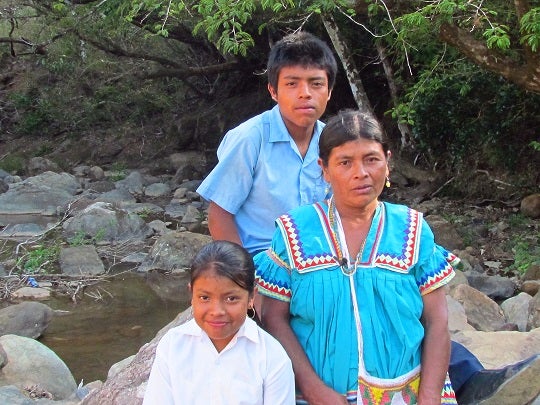by Angela Funez*
Video is in Spanish
We often ask: why do so many children not attend school? Or: Why do schools lack trained teachers? But we seldom think about the challenges that poor families in remote communities must face in order that their children attend school. And how difficult it is for governments to provide acceptable educational services under such conditions.
Juana Santos, who lives in the Ngäbe-Buglé indigenous territory 300 kilometers west of Panama City, has two major goals: that her children, Magdiel and Hector, receive a good education; and that they come back home from school safe and sound after a long and risky journey that includes crossing rivers and makeshift bridges. Some of her neighbors’ children must walk up to three hours to get to school, which many do on an empty stomach.
 Magdiel and Hector attend one of the 17 schools recently rehabilitated by the IDB and the Ministry of Education of Panama at a cost of US$10 million. At first glance, building schools would seem to be a straightforward proposition. But the area’s mountainous terrain made it a demanding feat. In fact, access to the area was so difficult that helicopters were used to transport some of the building materials, and the contractor had to bring in heavy equipment to build roads to reach remote communities.
Magdiel and Hector attend one of the 17 schools recently rehabilitated by the IDB and the Ministry of Education of Panama at a cost of US$10 million. At first glance, building schools would seem to be a straightforward proposition. But the area’s mountainous terrain made it a demanding feat. In fact, access to the area was so difficult that helicopters were used to transport some of the building materials, and the contractor had to bring in heavy equipment to build roads to reach remote communities.
The works were made possible by the participation of community members, who helped to load and transport materials. “I helped to build this school with my own hands,” said Esmeralda Perez, an indigenous leader of Llano Bonito. “I dug sand and gravel from the river,” she said. “I filled this bucket until it weighed some 70 pounds, and I made about 10 trips a day.” The construction company paid Esmeralda for her work.
Today this community has a new school, and students and teachers are more motivated to learn and to teach. The old school building, which still stands about 150 meters away, was a sort of shed, with adobe walls, a dirt floor, and rickety wooden benches. In contrast, the new facility, with its tiled classrooms, windows, and smooth ceilings, is the equal of schools in developed countries. Studies show a direct relationship between the quality of teaching space and improvements in student learning.
 “Now we have new dormitories, with closets to put our clothes,” says Zuleyka Lopéz, a teacher in a school in Batata, about an hour’s drive from Llano Bonito. “I’m more comfortable here than in my own home,” she added with a smile. In the former school dormitory, the three teachers hung their clothing from a ceiling beam and slept on three dust-covered cots. There was no electricity, no bathroom, and worst of all, they had to go from one to four weeks without seeing their families. Teaching in these schools is not just a job, but rather a true vocation. It is not easy for the government to find teachers willing to take on the challenge.
“Now we have new dormitories, with closets to put our clothes,” says Zuleyka Lopéz, a teacher in a school in Batata, about an hour’s drive from Llano Bonito. “I’m more comfortable here than in my own home,” she added with a smile. In the former school dormitory, the three teachers hung their clothing from a ceiling beam and slept on three dust-covered cots. There was no electricity, no bathroom, and worst of all, they had to go from one to four weeks without seeing their families. Teaching in these schools is not just a job, but rather a true vocation. It is not easy for the government to find teachers willing to take on the challenge.
 Fifth grader Magdiel, one of Zuleyka’s students, is much more animated in class. “My classroom doesn’t have a dirt floor anymore,” she said. “It’s cooler and we get light from the new sliding glass windows,” she added.
Fifth grader Magdiel, one of Zuleyka’s students, is much more animated in class. “My classroom doesn’t have a dirt floor anymore,” she said. “It’s cooler and we get light from the new sliding glass windows,” she added.
Zuleyka recalls that before when it rained, the students got wet. The noise of the rain hitting the tin roof was so loud that classes had to stop. The new school also has new educational materials and teachers’ guides. “We are breaking the cycle of poverty in this region,” affirmed the IDB’s Panama representative Tomas Bermúdez during the school inauguration.
Juana Santos sadly told how none of her 10 children finished high school. Magdiel and Hector, the two youngest, are coming close to achieving this goal, not only thanks to the new educational facilities in their community but also the nearly completed expansion of the high school grades in the El Peñón school, located a few kilometers from their community. Magdiel now has chance to achieve her goal of becoming a teacher―and without having to leave the area or her mother. Both children now have the opportunity to be the first in their family to earn a high school diploma, the ticket to lift them out of poverty and take advantage of opportunities that their older siblings did not have.
Angela Funez is a Senior Specialist in communications at the Inter-American Development Bank.



Great site, thanks a lot !!